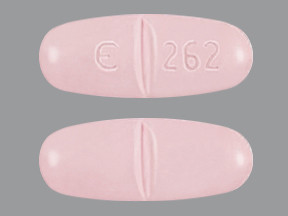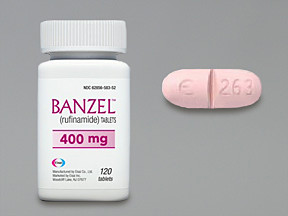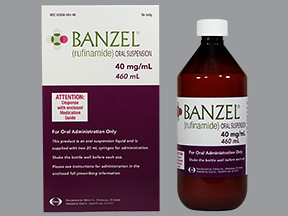RUFINAMIDE - ORAL
PHONETIC PRONUNCIATION: (roo-FIN-a-mide)
COMMON BRAND NAME(S): Banzel
GENERIC NAME(S): rufinamide
Uses
USES: Rufinamide is used with other medications to prevent or control seizures (epilepsy) associated with Lennox-Gastaut syndrome (LGS). This medication is an anticonvulsant. Rufinamide is thought to work by acting on the sodium channels in the brain that carry excessive electrical charges that may cause seizures.
How to use RUFINAMIDE - ORAL
HOW TO USE: Read the Medication Guide provided by your pharmacist before you start using rufinamide and each time you get a refill. If you have any questions, consult your doctor or pharmacist. Take this medication by mouth with food, usually twice daily or as directed by your doctor. If you are using the suspension form of this medication, shake the bottle well before each dose. Measure each dose carefully with the provided oral dosing syringe. Do not use a household spoon because you may not get the correct dose. Rinse the syringe with tap water after each use. To reduce your risk of side effects, your doctor may direct you to start this medication at a low dose and gradually increase your dose. It is very important to follow your doctor's dosing instructions exactly. It may take several weeks to reach the best dose for you and to get the full benefit from this medication. Take this medication regularly in order to get the most benefit from it. To help you remember, take it at the same times each day. This drug works best when the amount of medicine in your body is kept at a constant level. Therefore, it is best to take rufinamide at evenly spaced intervals throughout the day and night. Do not stop taking this medication without consulting your doctor. Some conditions (such as seizures) may become worse when the drug is suddenly stopped. Your dose may need to be gradually decreased. Tell your doctor if your condition does not improve or worsens.
Side Effects
Precautions
Interactions
Overdose
Images
Reviews
Faq for RUFINAMIDE - ORAL
Rufinamide is an oral medication used to treat seizures associated with Lennox-Gastaut syndrome, a severe form of epilepsy that typically affects children.
Rufinamide works by stabilizing electrical activity in the brain and reducing the frequency of seizures.
Common side effects of Rufinamide may include dizziness, fatigue, headache, nausea, vomiting, and coordination problems.
Rufinamide is usually taken orally, with or without food, as directed by your doctor. The dosage and frequency will depend on your age, weight, and the severity of your condition.
Rufinamide may interact with other medications, so it is important to inform your doctor about all the medications you are currently taking. They can determine if any adjustments or precautions are necessary.
The effectiveness of Rufinamide can vary from person to person. In some cases, improvement in seizure control may be noticed within a few weeks, while in others it may take several months.
Rufinamide should only be used during pregnancy or breastfeeding if the potential benefit justifies the potential risk to the fetus or infant. It is important to discuss this with your doctor before taking the medication.
Disclaimer
IMPORTANT: HOW TO USE THIS INFORMATION: This is a summary and does NOT have all possible information about this product. This information does not assure that this product is safe, effective, or appropriate for you. This information is not individual medical advice and does not substitute for the advice of your health care professional. Always ask your health care professional for complete information about this product and your specific health needs.



No Reviews Yet